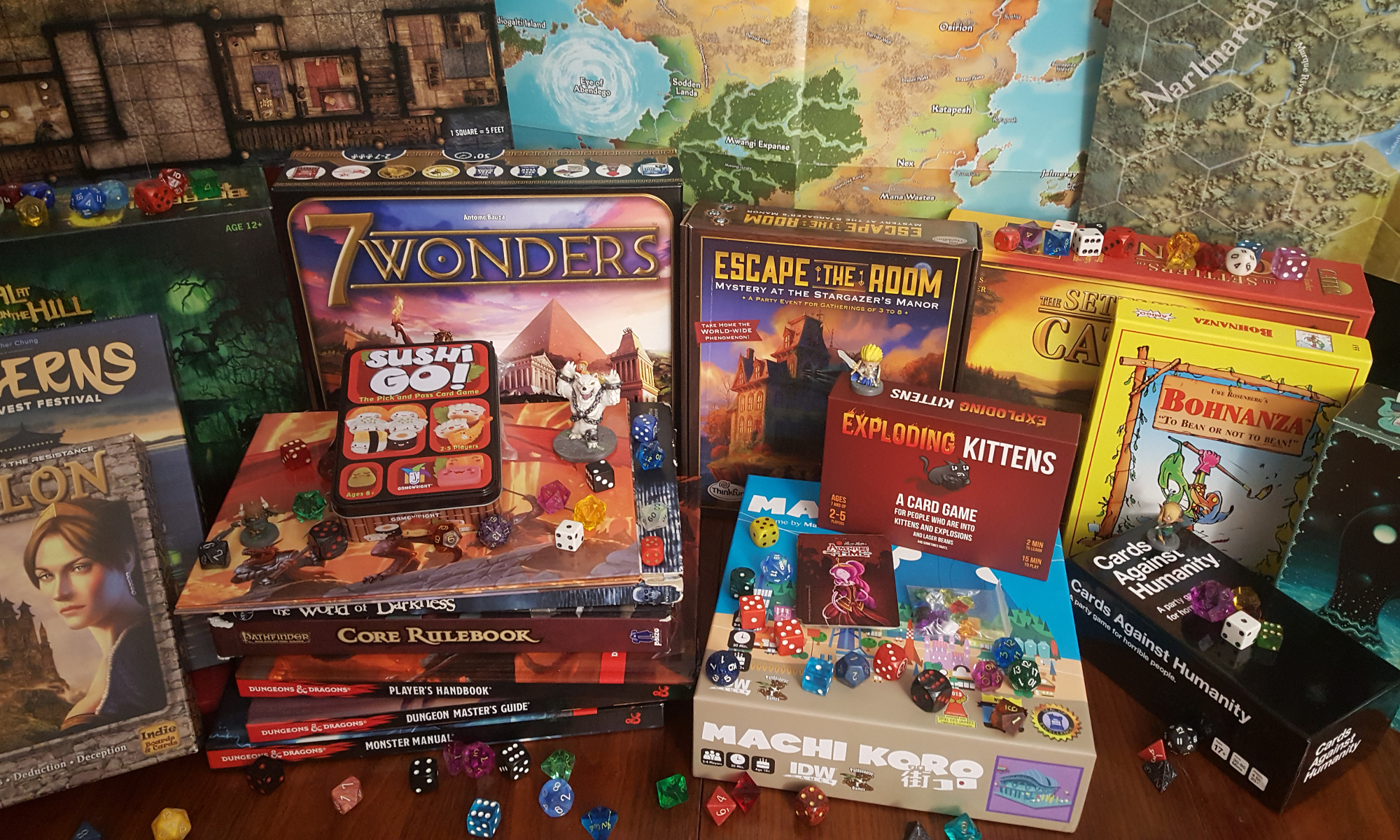Today at Save Vs. Rant, the story’s the thing as we discuss lore, and why it’s important even in everyday board games. Every game can have a story, whether that story is just an excuse for a game, or the game is just an excuse for a story.
“Ok, each turn you choose a player to potentially sit out the turn by secretly concealing a card that says whether they sit out. Each player has a limited number of cards that actually make other players sit out and a larger number of bluffing cards. One player has the ability to make any other player change their choice. Simultaneously, each player decides whether to surrender, giving up their opportunity to score, or risk being eliminated. If you are eliminated 3 times – even multiple times in a single round – you are completely eliminated from the game. Once it’s been determined who hasn’t been eliminated, those individuals take turns drafting from cards that either give a fixed number of points, or a variable number of points based on how many of that specific type of card the player has, or even a bonus based on having the most. The option to have the power to force other players to change their choice of elimination, additional attempts to eliminate and removal of past eliminations may also be available to draft.”
That’s a mouthful. Compare:
“Every player has a foam gun and a number of click and bang cards. Each turn, you point the gun at someone and hide either one of your click or bang cards. The boss gets to make someone switch their target. Then, everyone gets a chance to duck out, giving up a chance to get loot so they don’t get shot. If you don’t duck out and you get shot, you don’t get loot, and if you’re shot three times, you’re dead and out of the game. Everyone takes turns drafting loot, which can be paintings (worth more with a collection), diamonds (worth a bonus for having the most) or cash (fixed value). The position of boss, extra bullets and bandages (which remove injuries) may also be in the loot.”
Still a mouthful, but a fully comprehensible and relate-able mouthful that doesn’t sound like the technical manual for Mandatory Doubleplusgood Fun Activity Time. That’s the difference lore can make. If you have a good game, it can almost certainly be made better by tying it to something we connect with culturally and aesthetically. That’s what lore is all about. That’s the fluff of the game that compliments the crunch.
Games we mentioned today, for better or for worse:
Sorry, Monopoly, Connect Four, The Game of Life and Yahtzee! are all forgettable games, and most people have one or more of them sitting on their shelf. And before someone decides to go, “Hurr, durr, you’re playing Monopoly wrong – Free Parking is nothing and you’re supposed to auction houses” WE KNOW THAT. The game is still garbage – I mean, really irredeemable garbage – even if you play it correctly. Especially if you play it correctly. If I could completely destroy one board game from history, it would be Monopoly. My wrath would be swift and without mercy.
Tales of the Arabian Nights is long and frequently frustrating, but you’ll forgive it when you find yourself praying to a Djinn and discovering great wealth while you are whisked away to the City of Brass fleeing from a ghoulie.
Libertalia is a trick-taking card game with a really good pirate skin over it. Pirates who aren’t very good at pirating do their tricks first, while pirates who a really good at pirating wait til the last minute. Everything is described in terms that are both narratively appropriate and intuitive. Everyone has a good time.
Jumanji is a movie. It should have stayed that way.
Cash and Guns is the best Mexican standoff you’ll every play. Point foam guns at your friends and family. Become a mob boss. Divvy loot. Collect paintings. Enjoy John Kovalic’s delightful art!
Kingmaker is my favorite Adventure Path, and Wrath of the Righteous is Jeremy’s. Paizo has been making these since D&D 3.0, and they have gotten it down to a fine art. Take a party from 1st to 18th level or so (sometimes a little more, sometimes a little less). Do it in style!
Dixit is beautiful. It doesn’t have a story, but it doesn’t really need one. Mysterium is also beautiful, but it has a story. And some expansions. And all of Dixit is also potentially an expansion to Mysterium, so that’s neat as well. Seriously – amazing games with outstanding art. You’ll love them.
The Dragon Age RPG is a sad disappointment. If you want to see people enjoy it, watch Tabletop on YouTube, but for us it was a bust. Same with A Song of Ice and Fire Roleplaying, but Tabletop didn’t do an episode about that to my knowledge. Maybe they will someday and they’ll enjoy it. Who knows? We did not.
Games we didn’t mention but should have are Microscope and Fiasco, which are paradoxical to this discussion because they both are almost exclusively about lore, but they don’t provide that lore to you. The actual rules crunch of the games is negligible and exists to facilitate the creation of the fluff. Microscope is essentially about creating a world, and Fiasco is essentially about creating a Coen brothers film. They are both truly intriguing collaborative storytelling experiences. Check them out! We’ll probably find an excuse to discuss them sometime.

